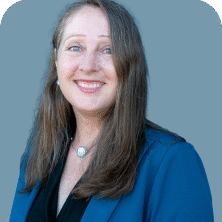
Laura Elliott Adams, M.S., CCC-SLP
I like to watch the credits. I’m the person at the movie theater sitting there still immersed in the “outro” music that transitions you back into reality while reflecting on what was just experienced. I like taking the time to reflect on the hundreds of people who put their expertise and energy into the production. Two of my pet peeves? Credits on fast forward and autoplay settings that completely skip the credits. They strip us of the opportunity to reflect.
At the end of the year, I’d like to take a moment to consider the gift of reflection. It allows us to take an experience and break it down into all the little pieces. We need to reflect to create meaning. We reflect to problem solve. We reflect as we transition into a different language task. But it takes time. Sometimes we need to actively dedicate the time because it’s so tempting to quickly get up, walk away, and get on with what is next. In our world of “short attention span theater,” I think we sometimes lose this skill of reflection.
Let’s reflect on the skill of reflection and how it enhances our language process.
1). Cognitive planning for social skills.
Stop, plot, go, so. This was spelled out in one of the early pragmatic social-language group worksheets we used (Fun Fact: Peninsula Associates was the first speech-language practice in Northern California to provide group pragmatic language therapy back in the 90s!) Stop: figure out that you need to apply a social strategy skill. Plot: pick which skill(s) you need for a situation. Go: Do it. So: reflect on what worked, what didn’t work and use this information for your next plan. We can’t learn from our mistakes without reflection.
2). Self-monitoring.
Our brains continually take incoming information and reflect on what needs to be maintained or altered. It goes beyond cognitive thought. If it’s working correctly, it’s lightning-quick without our even noticing. If it’s not working correctly, we need to apply our manual reflection skills. Phonological skills often work on perception; we often ask clients to reflect on what they said and what they heard. We recognize grammatical errors instantly (a client once told me it’s a “super power” he has). But then again, do we lay down or lie down? Hmmm. Let me reflect a bit on that.
3). Feedback.
Structured feedback hones the skill of reflection. The feedback a clinical supervisor gives teaches the student clinician how to reflect on the session and make changes for the next session. The feedback the SLP shares during therapy does the same thing. Did you notice how x changed when you did y? What did you adjust to make that happen? Next time try x,y,z. How did that work? Wow, you did x! How did that feel? (I wonder why my SLP is tilting their head and looking a bit puzzled. Maybe I didn’t hit my target. Upon reflection, I’ll try something a bit differently next time.)
Reflection is a powerful skill. We don’t just do it at the end of the year; we do it all year long. As we end one year and head into the next, I’m glad we had this moment to reflect on it. Queue the outro music. Visualize those credits. Thank you for taking the time to reflect.








Our Locations
100 O’Connor Dr #21,
San Jose, CA 95128
- San Jose
1220 University Drive, Suite 202,
Menlo Park, CA 94025
- Menlo Park
760 Polhemus Road,
San Mateo, CA 94402
- San Mateo

